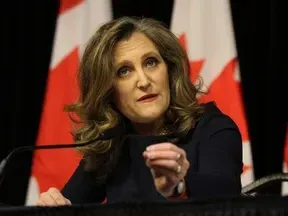
Budget Fallout
Canada's 2024 Budget: A Prudent Approach Amid Economic Uncertainty
In an era marked by economic flux and rising global challenges, Canada's 2024 budget, orchestrated by Finance Minister Chrystia Freeland, stands as a testament to cautious optimism and financial pragmatism. The budget navigates the complexities of economic recovery and fiscal responsibility, emphasizing deficit management, public debt control, and revenue generation through new taxation.
Holding the Line on Deficit
The Canadian government has set a precise course to manage its deficit, projecting a $40 billion shortfall for the 2023-24 fiscal year—a slight improvement over previous estimates. This figure represents a meticulous balancing act between spending and fiscal restraint, achieved in part through the implementation of several new taxes following recent spending increases. Economists, such as Rachel Battaglia from Royal Bank of Canada, acknowledge the efforts made to maintain fiscal targets, albeit through increased taxation.
Future Deficit and Economic Growth
Looking forward, the budget forecasts that deficits will dip deeper into the red compared to earlier projections, with no clear strategy to achieve a balanced budget within the forecast horizon. This has sparked some concern among economists like Charles St-Arnaud from Alberta Central, who notes the absence of a plan to balance the fiscal books. Nevertheless, the government has committed to reducing the deficit as a share of GDP, aiming for a deficit-to-GDP ratio of less than one percent starting from 2026-27.
Debt Management and Economic Resilience
The 2024 budget also addresses the escalating cost of public debt, a significant fiscal challenge. Interest payments on debt are expected to rise, consuming an increasing portion of the federal revenue. By 2023-24, debt charges will account for 1.6 percent of GDP, a stark increase from previous years. This trend raises concerns about fiscal sustainability, as highlighted by Toronto-Dominion Bank economists led by Beata Caranci.
Despite the daunting debt figures, the government remains optimistic about economic resilience. The budget declares the threat of recession "done and dusted," with early economic performance in 2023 surpassing expectations. This optimism is reflected in the projected growth rates and the higher-than-anticipated GDP figures, which, according to the budget, could lead to smaller deficits than initially expected.
Revenue Strategies and Tax Initiatives
Central to the budget's strategy is the expansion of the tax base. The government plans to increase capital gains taxes for both corporations and high-earning individuals, expecting to generate substantial revenue over the next five years. Additional measures include a digital services tax and a global minimum tax on the profits of large multinational corporations, aiming to bolster federal revenues significantly.
This strategic increase in revenue is crucial as it supports government spending without further deepening the fiscal deficit. Moreover, it aligns with global trends toward ensuring that corporations and wealthy individuals contribute a fair share to national development.
Economic Forecasts and Public Reaction
The budget has received a mixed response from economists and the public alike. While some commend the government for its cautious approach to spending, others argue that the projected economic growth could have allowed for more ambitious fiscal measures to reduce the deficit more substantially. The debate centers on whether the government is making optimal use of its fiscal room or if caution is overshadowing potential for more significant economic reform.
Conclusion
Canada's 2024 budget is a blend of caution and strategic taxation aimed at fostering a stable economic environment while managing a significant public debt burden. As the country moves forward, the effectiveness of these measures will be crucial in determining Canada's fiscal health and economic stability. The government's ability to balance immediate needs with long-term fiscal sustainability will continue to be a subject of national discussion, shaping the economic landscape for years to come.
